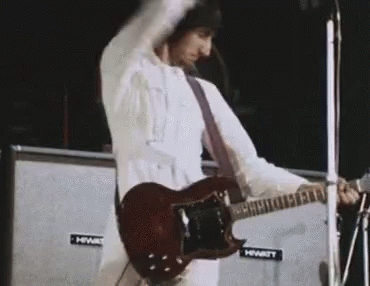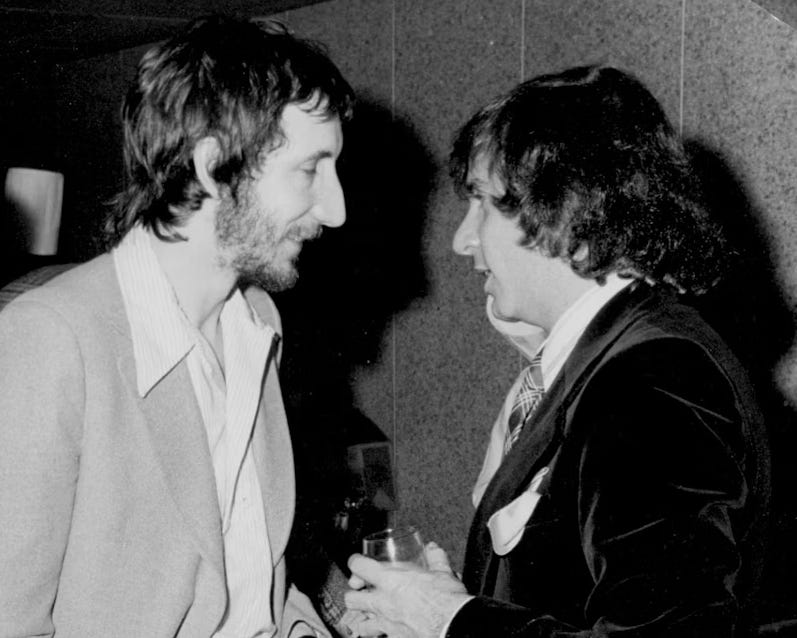"Rough Boys" - Pete Townshend
On Exploring Your Feminine Side
When aggression became an albatross, Pete Townshend found his feminine side.
Got a Feeling Inside, I Can’t Explain
The stage is trashed, the wreckage barely visible through plumes of smoke piped in from an unknown source. A demon in the shape of a man is unrelenting as he beats his drum kit to the point of implosion. The guitarist, meanwhile, punishes his instrument for the eardrum-shattering distortion it creates, smashing it into a hundred bits before disappearing among the ash. It’s a cool June night in 1967. Thousands of teenage runaways from every rural town in America had descended onto the streets of San Francisco, lured by the promise of “dropping out” of conservative society — and war — in favor of communal living and LSD.
It was called the “Summer of Love,” and the Monterey Pop Festival was the culmination of the revolution. This was America’s first introduction to British mod rockers, the Who, and their brand of rebellion looked more like assault than flowers in your hair. American kids could have their love-ins. The Who favored the aggressive side of counterculture.
Guitarist and primary songwriter for the Who, Pete Townshend, practically invented the macho guitar rock god persona. The power chords, the power stance, the guitar smashing — Pete Townshend started all of that. He was punk before there was punk, heavy metal before there was heavy metal.
Fellow future rock deity, Jimi Hendrix, was also set to perform at the Monterey Pop Festival that night. He’d already begun borrowing Townshend’s guitar-smashing spectacle at other shows. Backstage, he and Townshend flipped a coin to determine who would perform last because neither wanted to follow the other. Townshend won. Jimi had to follow the Who’s stage-wrecking antics. So he did the only thing he could to top it: he lit his guitar on fire.
Pete Townshend, the Who’s outspoken ringleader who sometimes turned violent (he once wielded his guitar at lead singer Roger Daltry’s head during a fight) is one of the most written about names in rock n roll. He’s lauded as one of the best guitarists of all time, a pioneer of heavy rock, and a prolific songwriter. Along with wildly talented and wildly unhinged drummer Keith Moon, he is the template for the rock and roll trainwreck — sex, drugs, and getting banned from all Holiday Inns for life for debaucherous parties where televisions are tossed from windows and cars end up in swimming pools.
Considering how much his life has been dissected in rock n roll history, Townshend is rarely looked at as a queer icon. He didn’t come out until later in his career and waffled about his sexuality before that. But, we don’t have to dig too deep into his catalog (and interviews) to reveal that his destructive behavior and need to rebel was, in part, because of a yearning to buck the toxic masculinity he came to symbolize.
Take, for example, the Who’s 1967 single, “Tattoo,” which confronts the pressures to conform to hyper-masculine standards of manhood.
Me and my brother were talking to each other
About what makes a man a man
Was it brain or brawn, or the month you were born?
We just couldn’t understand
Our old man didn’t like our appearance
He said that only women wear long hair
To appease their father’s insecurities, the singer and his brother get tattoos to prove their worthiness. It’s a choice he knows he’ll regret.
Welcome to my life, tattoo
I’m a man now, thanks to you.
I expect I’ll regret you
By the end of the song, the singer has presumably tattooed the word “mother” on his arm as an act of rebellion against toxic masculinity. To further the point, he reveals that his wife is tattooed too, suggesting this symbolic gesture isn’t about manhood at all. According to the book, The Complete Guide to the Music of the Who, “Tattoo” is one of Townshend’s favorites from his catalog.
Another early example of Townshend confronting gender roles is the 1966 hit, “I’m a Boy.” The song was originally intended as part of a rock-opera called Quads about a future where parents can choose the sex of their children. The opera was scrapped, but “I’m a Boy” was released as a single and became one of the first songs penned about gender dysphoria.
One girl was called Jean Marie
Another little girl was called Felicity
Another little girl was Sally Joy
The other was me, and I'm a boy
My name is Bill, and I'm a head case
They practice making up on my face
I'm a boy, I'm a boy
But my ma won't admit it
I'm a boy, I'm a boy
But if I say I am, I get it
My Love is Vengeance
At the end of the ‘70s, the Who had suffered a devastating setback when drummer Keith Moon died of an overdose in 1978. Townshend set out to write albums for not only the band — as it weathered on — but also for himself. He was ready to explore parts of his life he hadn’t yet revealed in public. Empty Glass was released in 1980, and it contained two songs that spoke to his bisexuality: “And I Moved,” plus the hit single, “Rough Boys.”
In “And I Moved,” Townshend illustrates both the beauty and the culture of shame around same-sex intimacy.
And his hands felt like ice exciting
As he laid me back just like an empty dress
And I moved
But a minute after he was weeping
His tears his only truth.
And I moved
But I moved toward him
In “Rough Boys,” Townshend takes a more provocative approach.
Tough boys, come over here
I wanna bite and kiss you…
Gonna get inside you
Gonna get inside your bitter mind
I wanna see what I can find
Rough boys, don't walk away
I wanna buy you leather
Make noise, try and talk me away
We can't be seen together
Somehow, “Rough Boys” didn’t set off any alarms as a gay song when it was released. “I wanna get inside you” was just a no-homo kind of thing rough boys might say to each other in 1980. It wasn’t until a 1990 interview with Newsweek that Townshend admitted to the song’s message. “In a way, it was a coming-out. That it was a real acknowledgment of the fact that I’d been surrounded by people that I really adored — and was actually sexually attracted to — who were men.” Townshend also revealed that he was able to deeply tap into his feminine side. “I know how it feels to be a woman because I am a woman, and I won’t be classified as just a man…the side of me that responded to those people was a passive side, a subordinate side.”
Townshend would retract and reassert his sexual orientation several times. In 1994, he denied his initial admission. In an interview with Playboy, he said:
“I did an interview saying ‘Rough Boys’ was about being gay, and in the interview I also talked about my ‘gay life,’ which — I meant — was actually about the friends I’ve had who are gay,” he said. “So the interviewer kind of dotted the T’s and crossed the I’s and assumed that this was a coming out, which it wasn’t at all.” Townshend discussed facing bigotry. “But I became an object of ridicule when it was picked up in England,” he recalled. “It was a big scandal.”
During a 2002 interview with Rolling Stone, Townshend was asked if he was bisexual. He said he was not; he simply had a feminine side.
In another interview with Rock Cellar, he said that he was no longer pansexual. (In this same interview, Townshend also mentions that he is 58 years old, which would’ve put this original quote at around 2003.) “With I’m a Boy,’ the idea of masculinity and the way that men are seen to be at a time when I often forget, to be homosexual, to be pansexual, as I think I probably was, but not anymore. [laughs] But I think I was ready to fall into bed with anybody that would have me.[laughs}I think I forget that homosexuality was still illegal in the U.K., so these adventures had to be couched in vignettes of humor and irony.”
Then in his 2012 memoir Who I Am, Townshend changed his tune. He wrote that he was “probably bisexual” and realized it around 1967. He talked about having a short affair with Danny Fields, punk pioneer and former manager of Iggy Pop and the Stooges and the Ramones. He also said Rolling Stones lead singer Mick Jagger was the only man he ever “seriously wanted to fuck.” At a 2012 press conference for the Who’s North American tour, he joked about a rift between Keith Richards and Mick Jagger when Richards lied about the size of Jagger’s personal assets; he’d said it was small. Townshend corrected the record: “What I remember of the size of Mick Jagger’s penis — I remember it as being huge and extremely tasty,” Townshend laughed. “Let’s hope that makes the internet.”
It seems improbable that the brash rock god who ignited a teen rebellion with his guitar-smashing aggression would be the same artist who’d write beautifully haunting songs about the suffocating effects of toxic masculinity. But aggression can eventually become an albatross for men trapped in patriarchal gender roles. For Townshend, it’s when he tapped into his vulnerability, or his “feminine side” as he called it, that he wrote some of his most prolific and therapeutic music.
QUIZ TIME!
It’s so easy when know the rules. It’s so easy, all you have to do is…
Name the band the Who opened for on their first American tour…
A. Cream
B. The Kinks
C. The Rolling Stones
D. Herman’s Hermits
(Scroll for the answer.)
Like this post? If you felt inspired or learned something, consider supporting my work by upgrading to a paid subscription.
Quiz answer: The Herman’s Hermits
Did you catch our last issue?








He wrote “And I moved” for Bette Midler! https://bootlegbetty.com/2019/03/01/audio-in-1980-pete-townshend-of-the-who-wrote-a-song-for-bette-midler-she-rejected-it/
Love you Pete!!